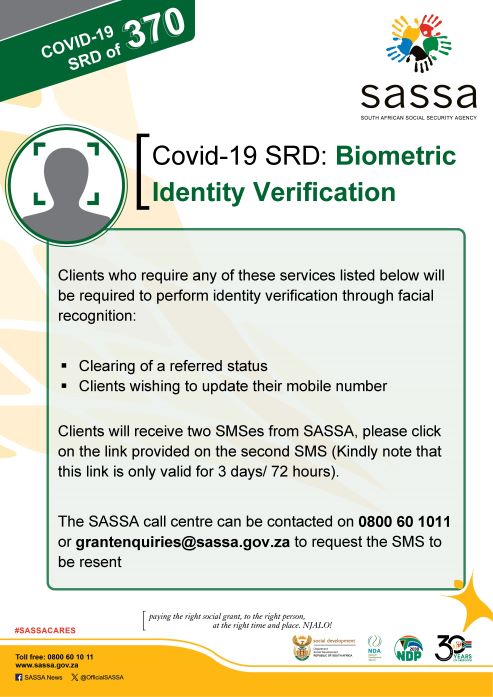SASSA SRD grant recipients struggling to get paid due to Biometric ID verification
The Social Relief of Distress (SRD) grant beneficiaries face potential suspension of their grants if they do not complete a mandatory identity verification process, warns the South African Social Security Agency (SASSA). This initiative, aimed at combating fraud, requires beneficiaries to undergo biometric identification, a measure introduced earlier this year in response to increasing instances of fraudulent activities associated with the grant.
According to Elizabeth Raiters of #PayTheGrants, numerous beneficiaries have expressed frustration, citing difficulties in accessing their grants due to these new verification requirements. Raiters disclosed that #PayTheGrants has received numerous complaints nationwide regarding this issue.

Why should I complete the ID Verification?
Paseka Letsatsi, SASSA spokesperson, emphasized the necessity of biometric verification to safeguard the integrity of the SRD grant program. Letsatsi stated that SASSA has observed significant fraud levels linked to the R370 monthly SRD grant. Initially applicable to beneficiaries updating their mobile numbers, the verification process now extends to individuals suspected of identity theft, including those vulnerable to such crimes at financial institutions.
“In essence, beneficiaries flagged for identity verification undergo an electronic “Know Your Client” process akin to procedures utilized by banks,” Letsatsi explained. The process entails beneficiaries receiving an SMS link to an online platform, where they must submit a facial photograph for verification purposes.
Critics argue that the verification process poses challenges for beneficiaries lacking smartphones or internet access. “This requirement disproportionately affects vulnerable groups,” Raiters noted, stressing the potential delays in grant disbursements for June and beyond.
Regarding consequences for non-compliance, Letsatsi affirmed that grants would remain suspended until verification is completed. However, the exact number of affected beneficiaries remains unspecified, with SRD recipients totaling between 7.5 million and 8.5 million, subject to monthly eligibility checks.
One affected beneficiary, Lerverch Pieters, expressed dismay over the additional hurdle delaying his June payment. “I depend entirely on the SRD grant,” Pieters lamented, highlighting the critical role of these funds for his family, which includes a child receiving a separate grant.
Despite concerns raised by #PayTheGrants about communication gaps from SASSA regarding the verification process, Letsatsi did not comment on these specific grievances. The advocacy group remains adamant about the potential dire consequences of delayed payments, potentially leaving thousands without essential financial support.
As the debate continues, stakeholders urge SASSA to address communication deficiencies and streamline the verification process to mitigate adverse impacts on vulnerable beneficiaries reliant on the SRD grant for survival.
